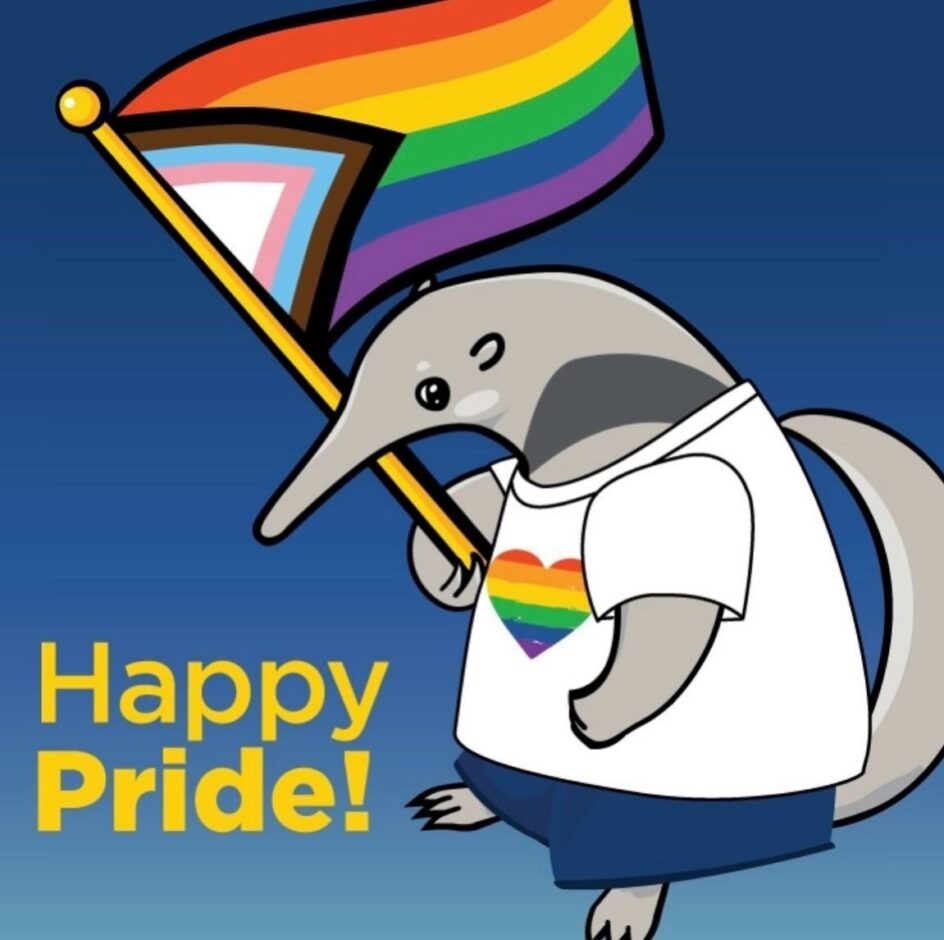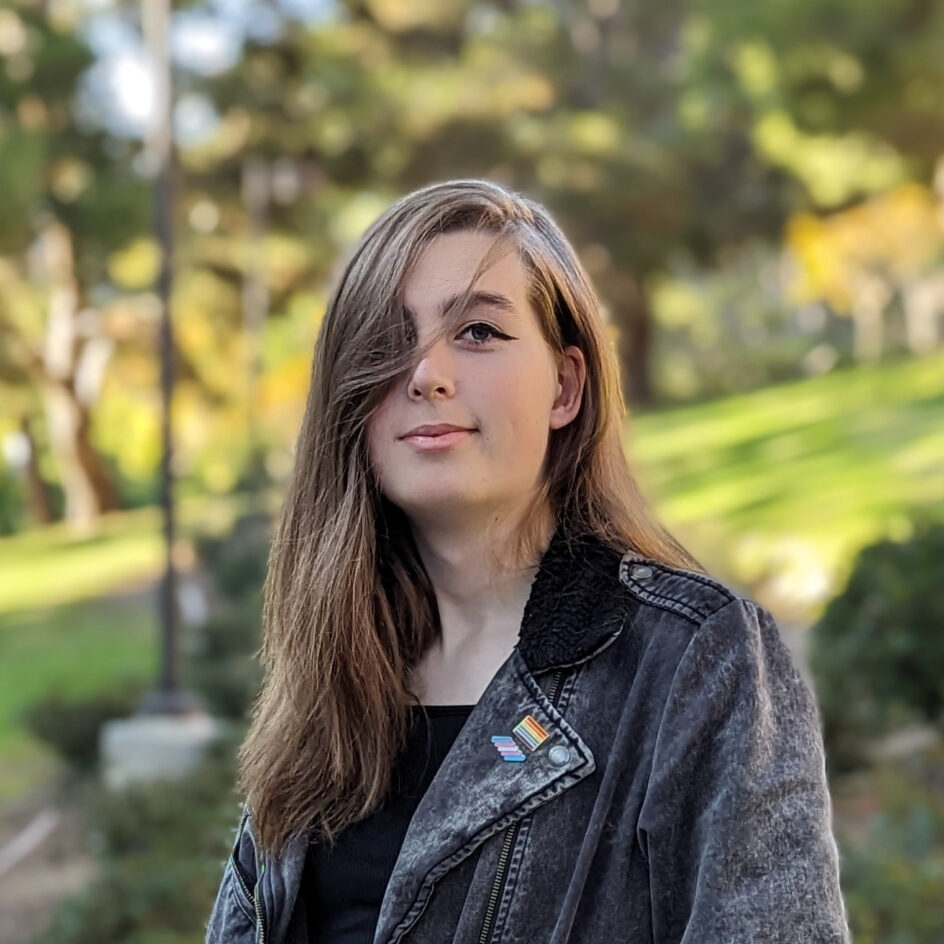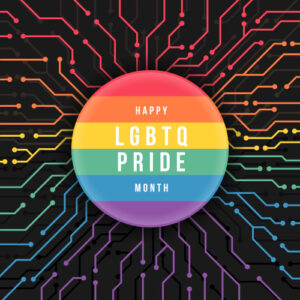Pride Month 2024: Supporting LGBTQ+ in Tech

For Pride Month, UC Irvine’s Donald Bren School of Information and Computer Sciences (ICS) has updated its list of LGBTQ+ resources, including on-campus support, nationwide organizations for networking, and articles and books that focus on LGBTQ+ in STEM. We also highlight current leaders in tech and faculty members doing cutting-edge work in ICS.

“In tech as a whole, there are a ton of queer developers,” says recent ICS graduate Sam Hansen, “but unfortunately the industry has historically not been vocally supportive or representative of LGBTQ+ people.” As Hansen explains in a Senior Spotlight interview, the industry needs “more queer-led and authentic representation.” She hopes to provide that as an indie game developer.

“The LGBTQ+ community has made remarkable contributions to the field of computing, from gay computer scientists Alan Turing and Tim Cook to lesbians Edie Windsor and Megan Smith to trans computer scientists Lynn Conway and Audrey Tang,” says Debra Richardson, the founding dean of ICS. “This month and throughout the entire year, let’s celebrate those contributions. All of us in the LGBTQ+ community deserve to feel welcomed, valued and supported by our peers.”
Fostering Campus Support
The UCI Lesbian Gay Bisexual Transgender Resource Center (LGBTRC) provides a wide range of education and advocacy services supporting intersectional identity development. It fosters community, wellness, and an open and inclusive environment for lesbian, gay, bisexual, intersex, transgender, queer, asexual, ally, and questioning students, faculty, staff, and the larger campus community. It strives to develop an atmosphere of acceptance and wellbeing in which the campus community can support the academic mission of the university.
UCI Libraries has also compiled a list of resources, including historical materials on key LGBTQ+ milestones and figures at UC Irvine, in Orange County and beyond. In addition, research guides and archival collections document political, social and cultural movements throughout the 20th century and up to the present day. Also available are a host of books, films and art created by LGBTQ+ artists and honoring the community.
Exploring LGBTQ+ Networking in STEM
For support beyond UCI, specific to STEM and the tech sector, there is a variety of nationwide/global organizations:
- Lesbians Who Tech is a community of LGBTQ women, non-binary and trans individuals in and around tech (and the people who support them).
- LGBT Tech develops programs and resources that support LGBTQ+ communities and works to educate organizations and policy makers on the unique needs LGBTQ+ individuals face when it comes to tech.
- LGBTQ in Technology Slack is a space for LGBTQ people in technology to chat and support each other.
- Out for Undergrad (O4U) helps high-achieving LGBTQ2+ undergraduates reach their full potential in business, engineering, marketing, and tech.
- Out in Science, Technology, Engineering and Mathematics (oSTEM) is a non-profit professional association for LGBTQ+ people in the STEM community.
- Out in Tech creates opportunities for its members to advance their careers, grow their networks, and leverage tech for social change.
- Out to Innovate is a professional society and global community of LGBTQ+ students and professionals in science, technology, engineering, and mathematics.
- Pride in STEM is a charity run by an independent group of LGBTQIA+ scientists and engineers from around the world.
- StartOut, a nonprofit that helps LGBTQ entrepreneurs achieve their aspirations.
Reading and Learning
Who are some LGBTQ+ individuals whose work has played an integral role in the development of modern computer technology? The article, “Programming Pride: 10 LGBTQI+ Pioneers of Computer Science,” starts with Russian mathematician Sofia Kovalevskaya (1850-1891), includes Alan Turing and Apple CEO Tim Cook, and concludes with Internet pioneer Mary Ann Horton and Taiwanese computer programmer Audrey Tang.
Other trailblazers can be found in the following:
- “LGBTQ+ History Month Spotlight: The Black Trailblazers Transforming the Tech World,” which spotlights Black LGBTQ+ individuals who have used their platforms to advocate for diversity, equality, and social change.
- “You Can’t Be What You Can’t See: Increasing Visibility of LGBTQ+ Leaders in the Technology Industry,” where Nick Hall points out the need to ensure that people “feel able to be their true selves at work, regardless of race, gender or sexual orientation. This is especially crucial for Generation Z, as they are twice as likely to identify as LGBTQ+ compared to other generations.”
- “A Talk with Dr. Lauren Esposito, Founder of 500 Queer Scientists,” which discusses the 500 QS visibility campaign for LGBTQ+ people and their allies working in STEM and STEM-supporting jobs.
To gain a better understanding of LGBTQ+ contributions and to help change the culture, consider reading some of the following books:
- The Digital Closet: How the Internet Became Straight by Alexander Monea;
- Information Activism: A Queer History of Lesbian Media Technologies (Sign, Storage, Transmission) by Cait McKinney;
- LGBTQ Digital Cultures: A Global Perspective by Pain Paromita;
- Pride in STEM by Emilie Dufresne (children’s book);
- Queer Data: Using Gender, Sex and Sexuality Data for Action by Kevin Guyan; and
- Video Games Have Always Been Queer by Bonnie Ruberg.
And for all you statisticians, be sure to read, “Towards Statistics Best Practices for Gender and Sex Data,” a paper outlining basic concepts to move us toward better practices for collecting and analyzing data about human gender and sex.
We also want to share two recommendations from Professor Roderic Crooks of the ICS Department of Informatics:
- Aberrations in Black: Toward a Queer of Color Critique by Roderick Ferguson, and
- Disidentifications: Queers of Color and the Performance of Politics by José Esteban Muñoz.
“I use queer of color critique in my research. It’s a framework from theorists such as Roderick Ferguson and José Esteban Muñoz that attends to power and the formation of the public,” says Crooks. “I take the term ‘minoritized’ from this body of work and apply it to research on social computing and public life. This is a terminological intervention that has been quite useful in human-computer interaction, for example.”
Crooks explains that unlike terms such as “underrepresented,” “minority,” or “underserved,” the term “minoritized” draws attention to the specific contours of American racial and sexual hierarchy in public life. “This term emphasizes power relations rather than demography,” he says, “and points to the ways that the public sphere is defined, constituted, and managed according to the specific interests of a dominant cultural group and according to enduring structural hierarchies based on race, class, gender, sexuality, legal status, disability and other consequential, interlocking forms of difference.”
Following Influential Leaders

Here is a list of 10 LGBTQ+ influencers in tech you might want to start following on LinkedIn if you aren’t already:
- Peter Arvai is executive chair and cofounder of Prezi, a software company that specializes in cloud-based presentations.
- Claudia Brind-Woody is a managing director at IBM and a champion of diversity and inclusion.
- Ann Mei Chang is CEO of Candid and author of Lean Impact: How to Innovate for Radically Greater Social Good.
- Jon “Maddog” Hall is a board chair at Linus Professional Institute.
- Arlan Hamilton is founder and CTO of Backstage Capital, which invests in companies led by women, people of color, and LGBTQ+ individuals.
- Vivienne Ming is cofounder and executive chair of Socos, which aims to combine machine learning and neuroscience to maximize the potential of students.
- Mark McBride-Wright is chair and cofounder of InterEngineering.
- Leanne Pittsford is founder and CTO of Lesbians Who Tech.
- Chris Sinton is chair emeritus at StartOut and co-founder of Network for Good (now Bonterra).
- Hayley Sudbury is founder and CEO of WERKIN, an analytics platform that utilizes behavioral science to improve diversity in company hiring practices.
Most of these names are pulled from “27 LGBTQ+ Scientists and Tech Leaders Shaping Our Future,” so read the full article to learn about other inspiring CEOs, engineers, and entrepreneurs who are working to break down barriers. You can also read a variety of personal “LGBTQIA+ in tech” stories through a series of blogs posted by Thoughtworks, a leading global technology consultancy company.
And for anyone wondering where the best place to work in tech might be, check out “Pride Month 2024 Special: Top 10 Tech Companies Championing LGBTQ+ Equality.”
Spotlighting ICS Faculty
Here, we spotlight two LGBTQ+ faculty members from our ICS community.

Lecturer Matthew Bietz teaches human-computer interaction (HCI), design, and software engineering in the Department of Informatics. His research focuses on data infrastructures that support collaborative work and social interaction, with a particular focus on the ethical aspects of pervasive data and algorithms. “The impacts of algorithmic and data-centric technologies are often felt most strongly by marginalized communities, including LGBTQ+ people,” says Bietz. “In both my research and teaching, I advocate for bringing justice into the design of information technologies.”

Assistant Professor of Informatics Roderic Crooks studies the intersections of race, technology, and public life. His current project explores how community organizers in working-class communities of color use data for activist projects, even as they dispute the proliferation of data-intensive technologies in education, law enforcement, financial services, and other vital sites of civic concern. He has published extensively in human-computer interaction (HCI), science and technology studies (STS), and social science venues on topics including political theories of online participation, equity of access, and document theory.
— Shani Murray